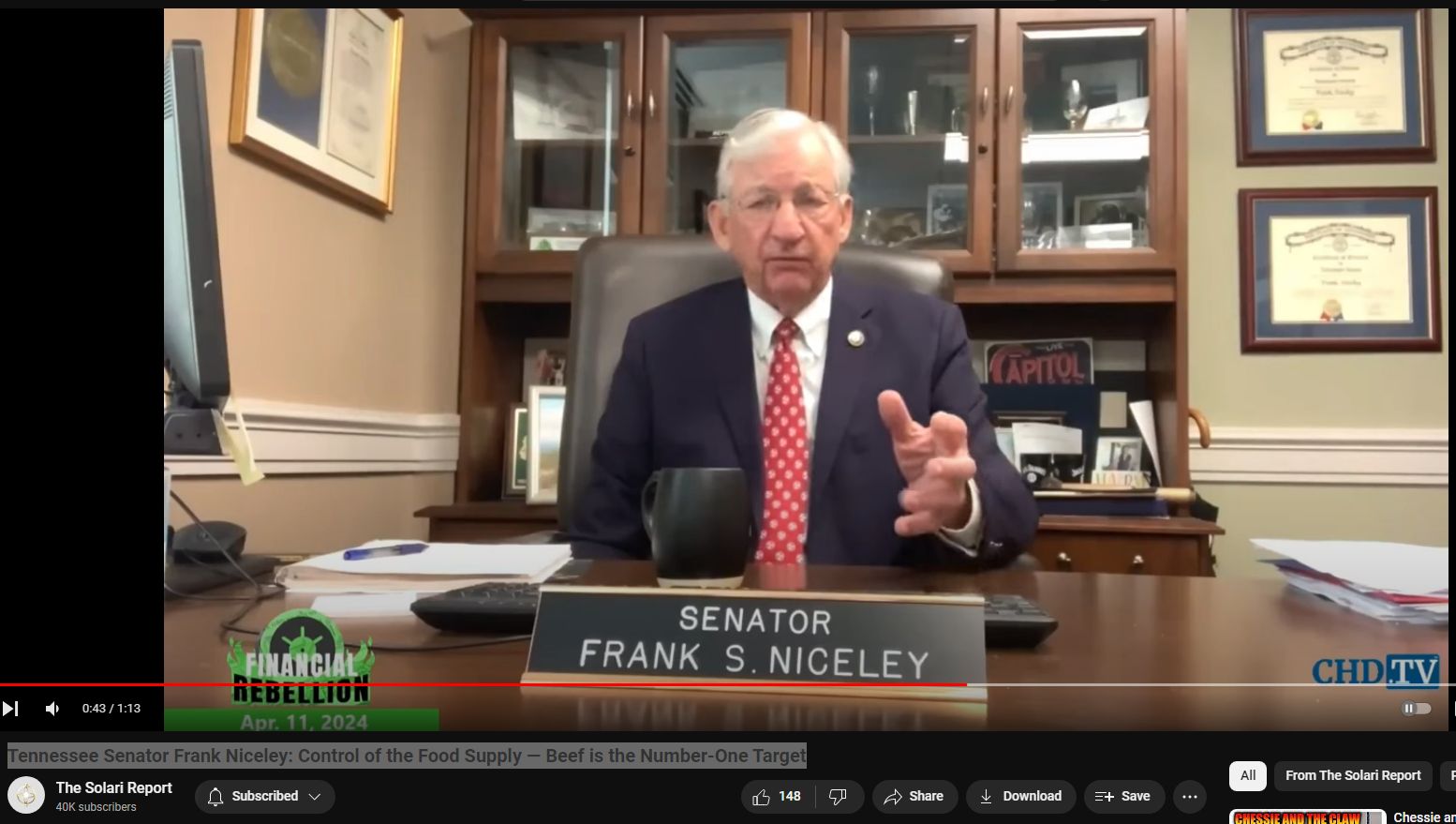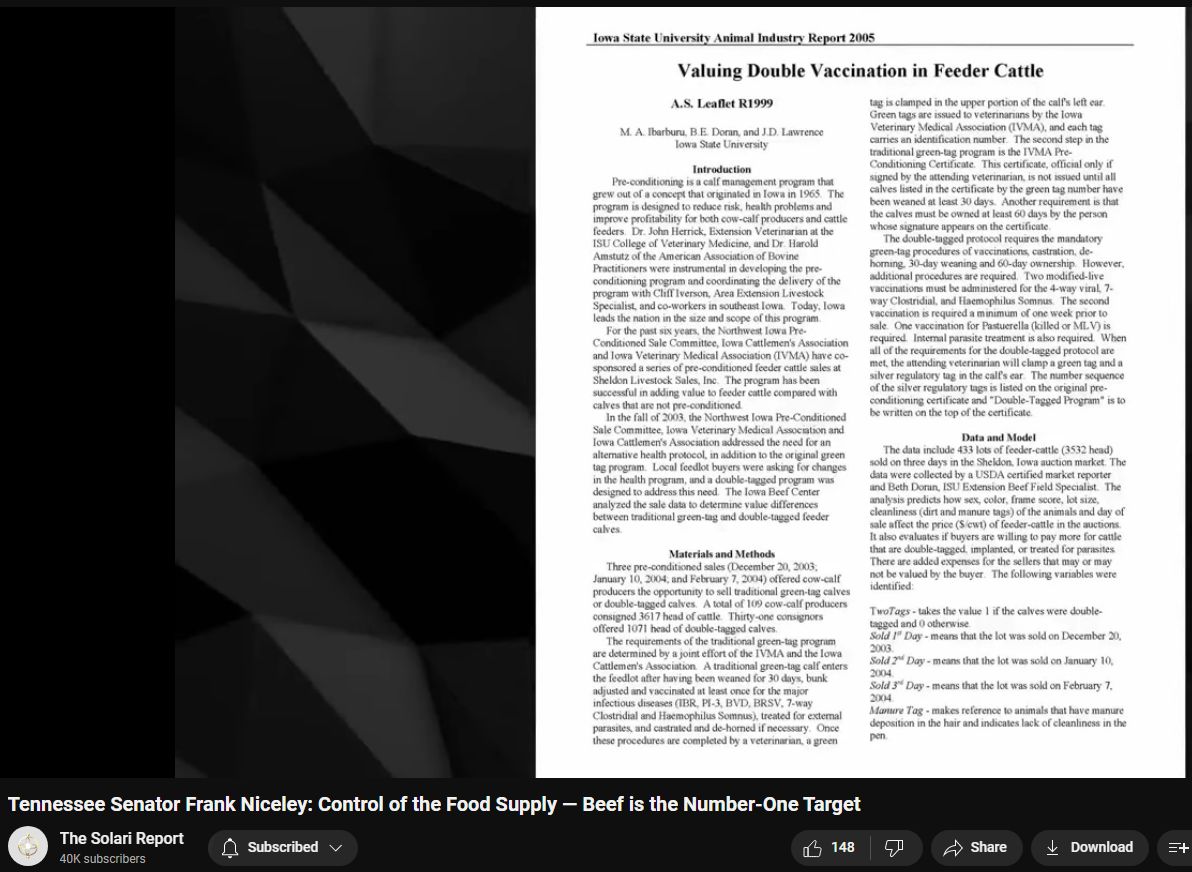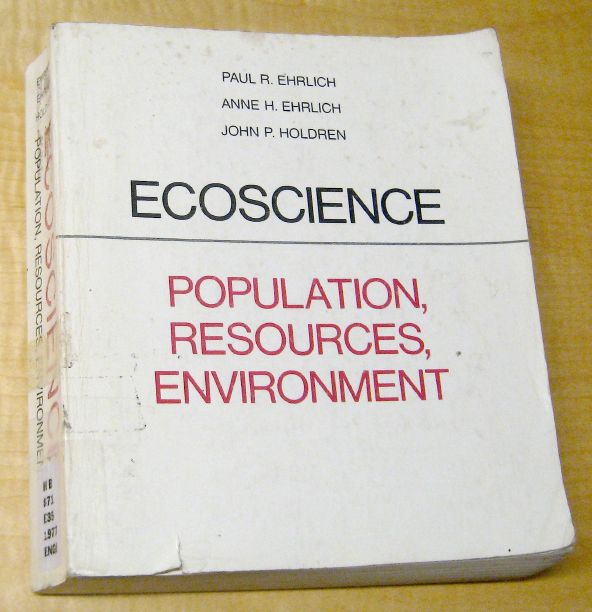Control of the Food Supply
Beef Cattle is the Number-One Target
1-minute length — https://www.youtube.com/watch?v=s3jlMK3mjYE (Solar Report interview w/ Tennessee Senator Frank S Nicely)


“ECOSCIENCE” the 1,400 page textbook on eugenics, depopulation means and control of food supply
Obama’s “science czar” John Holdren co-authored decades ago a 1,400 page textbook which concerns eugenics, depopulation by sterilization from poisoning of public water supplies, and control of food supplies as echoed by Kissinger (“useless eaters”, ‘control oil to control countries, but control food to control people’, etc). A summary of quotes is here
ECOSCIENCE by John Holdren Obama Science Czar (local PDF copy)

War on Food: The Battle for Control of the Cattle Beef Industry
In recent years, there has been a growing concern about the control that large agricultural businesses are gaining over the cattle beef industry. This so-called “war on food” is not just a fight for market share; it’s an intricate web involving GPS tracking, red tape laws, and even the echoes of eugenics. This blog post will delve into these issues, explore the catastrophic effects on small family farms and the local cattle industry, and examine the historical context provided by the Jesuits in the creation of beef farming.
The Rise of Big Agriculture and the Control Over Cattle Beef Industry
Large agricultural corporations have been steadily gaining control over various aspects of food production, with the cattle beef industry being a significant target. This consolidation has profound implications for small family farms and local cattle producers, who are increasingly squeezed out by the sheer scale and resources of these agribusiness giants.
One of the critical tools used by big agriculture to tighten their grip on the industry is GPS tracking. While ostensibly employed to improve efficiency and ensure better management of livestock, GPS tracking also allows these corporations to monitor and control every movement of their cattle. This technology can ensure compliance with stringent regulations, but it also means that small farmers, who may not have the resources to implement such technologies, are at a severe disadvantage.
Red Tape Laws and Bureaucratic Barriers
The introduction of numerous regulations and bureaucratic hurdles has also played a significant role in shaping the industry. These “red tape” laws often come under the guise of safety and environmental protection, but their complexity and the cost of compliance disproportionately affect small farmers. Large corporations, with their extensive legal and financial resources, can navigate these laws with relative ease, further entrenching their dominance.
Eugenics and the Influence of “Ecoscience”
The shadow of eugenics also looms over the cattle industry, particularly in discussions about selective breeding and genetic manipulation. The book “Ecoscience,” co-authored by John Holdren, discusses various population control methods, which, while primarily human-focused, reflects a broader mindset that can influence agricultural practices. The principles of eugenics, when applied to livestock, lead to selective breeding practices that prioritize certain traits over others, often disregarding the natural and diverse gene pool that small farmers traditionally maintain.
Impact on Small Family Farms and Local Cattle Industry
The combination of technological control, stringent regulations, and selective breeding practices has a devastating impact on small family farms and the local cattle industry. These farmers struggle to compete with the economies of scale enjoyed by large corporations. As a result, many are forced out of business, leading to a loss of local knowledge, diversity in cattle breeds, and the cultural heritage associated with small-scale farming.
Historical Context: Jesuits and the Creation of Beef Farming
The Jesuits, known for their missionary work and educational endeavors, also played a role in the development of beef farming. In the 16th and 17th centuries, Jesuit missions in South America introduced European cattle breeds and farming techniques to the indigenous populations. This integration of European and local practices laid the groundwork for the modern cattle industry in the Americas. Understanding this historical context helps us appreciate the long-standing influence of external forces on local farming practices.
Conclusion
The “war on food” and the attempts by big agricultural businesses to gain control over the cattle beef industry are multifaceted issues with deep historical roots and significant contemporary implications. The use of GPS tracking, the imposition of red tape laws, and the echoes of eugenics reflect a broader trend of consolidation and control that threatens small family farms and the local cattle industry. By examining these elements, we can better understand the stakes of this battle and the importance of supporting sustainable, local farming practices.
As we move forward, it is crucial to recognize the value of diversity in farming practices and to resist the overreach of large agricultural corporations. Supporting small farmers and local producers is not just about preserving a way of life; it’s about ensuring a resilient and diverse food system for the future.